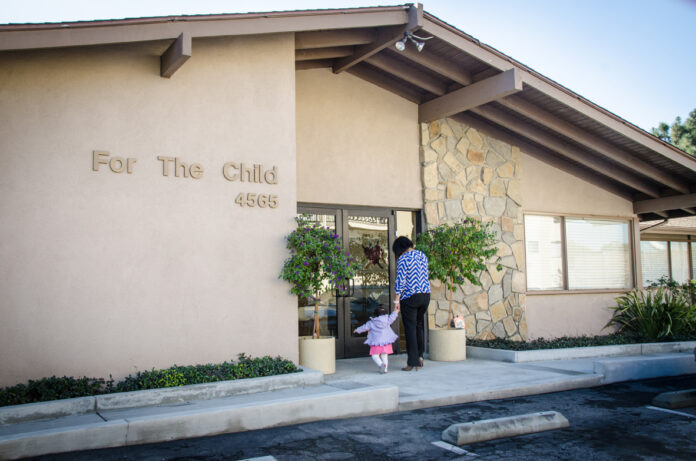Thanks to a five-year, $257,000 annual child abuse treatment grant (CHAT) from the California Office of Emergency Services (Cal OES), Long Beach-based For The Child (FTC) is able to provide additional services to uninsured children and to those who do not qualify for Medi-Cal. The allocation comes from the Federal Office of Victims of Crimes and is channeled through the State of California. FTC is the sole recipient of this grant in Long Beach to serve Long Beach and 22 surrounding communities.
“The funding is timely as we continue to emerge from the COVID-19 quarantine conditions,” shared FTC’s Executive Director Michele Winterstein. “This expanded resource for the community allows FTC to continue our existing services and add another therapist to the Child Abuse Program Team.”
FTC serves children birth to 18 years old, focusing on underserved and vulnerable children who are maltreated in any way: physically abused, sexually abused, neglected, or have witnessed violence. Experiencing trauma can lead to many problems with emotions and behaviors. These often include anxiety, sleep disturbance, intrusive memories about the abuse, trouble concentrating on school work, difficulty managing emotions (anger, fear, depression), and difficulty trusting in relationships. FTC offers services in both English and Spanish.
Winterstein explained that there is a misconception that all children are insured and have access to all services. Some children are not on Medi-Cal and their insurance does not cover these services. Those that do not have insurance at all usually fall into one of three common scenarios, according to FTC data. First, the parents are not functioning well enough to complete paperwork and apply because of their own mental health challenges. Second, the child is a U.S. citizen but the parents are undocumented and fear deportation even though FTC does not report to U.S. Immigration Services. Lastly, the child has Medi-Cal but has not yet developed symptoms of a mental health problem to be treated. They may need support, resources, and advocacy to help them through the child abuse investigation process, a service FTC offers.
“This grant addresses those gaps and allows us to offer treatment regardless of the insurance status. This grant allows us to take in the child and begin services and then help them obtain insurance approval when possible,” Winterstein said.
FTC remained open as an essential service throughout the COVID quarantine, providing a hybrid of in-person and telehealth services, with priority given to Department of Children and Family Serices (DCFS) and law enforcement referrals. Their Child Abuse Response Team volunteers continued responding with the forensic nurses and law enforcement the entire time.
Patricia Sanchez, the director of FTC’s Child Abuse Program has been with FTC for 13 years. According to her, “This funding allows us to treat about 100 more children and teens a year. Neglect is the most common issue we see, but we also see high numbers of sexual abuse and domestic violence exposure since we have experience successfully treating that kind of trauma.”
Though devastating in many ways, Sanchez said the results of the COVID shutdowns weren’t all bad.
“Because of the risks of meeting in-person during quarantine, we were able to increase the use of technology making it much easier for our clients to participate on a regular basis. It is in many ways better. They don’t have to worry about getting a babysitter for their other children and there’s no commute to worry about.”
In-person therapy remains an option for many clients, especially young children benefiting from play therapy and victims of sexual abuse who need privacy. During the shutdown while families spent more time together, FTC witnessed a variety of issues emerge. Some experienced job loss and food insecurity and for some this was the most time they had spent with their own families.
“We found that supplying board games gave families some structured time together. This was the first time ever that some of our clients experienced what it was like to be stay-at-home parents and have their children with them instead of at daycare,” Sanchez said.
Throughout COVID stay-at-home orders, FTC supplied their client families with food, grocery gift cards, and other basic needs through partnership with other agencies like Jewish Family and Children Services, giving out three times the usual amount. In addition, FTC delivered supplies to homes and coordinated several curbside drive-through events to give families board games, school supplies, therapy supplies, diapers, holiday toys, etc.
“As the families were closer together than ever, we saw an increase in the disclosure of historical sexual abuse. Children were more comfortable sharing while parent engagement was high,” shared Sanchez. “On the contrary, there was a decrease in real time reports of abuse. Once schools began reopening, we were flooded with referrals and took in 55 new children in the first two months.”
Since 1974 FTC has been strengthening families and making a difference in the lives of children who have faced abuse or neglect. At the heart of all of FTC’s programs are families experiencing stress, children at risk, child victims of abuse and neglect, and the families and community members that care for them. Safeguarding these children and working with children and families to provide the tools (and hope!) that they need to lead safe, happy, and productive lives direct our program development and delivery. Their existing array of services is designed to strengthen family resilience, develop healthy, behaviors and build supportive community connections.
FTC’s mission is simple and important. Children should be treated with respect and protected from abuse. The nonprofit 501c3 meets this challenge by providing both comprehensive child abuse treatment and trauma-informed mental health care, counseling, and therapy to strengthen families and provide the tools of healing to children.
To refer a child or family, contact FTC at (562) 422-8472.
All children will have the opportunity to reach their natural potential free from abuse or neglect. Children will be nurtured and cared for in loving families, they will be safe in their homes, their schools, and their neighborhoods.

